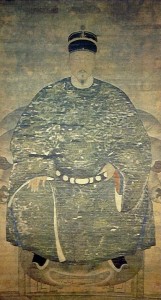Taiwan is an island which was originally populated by Malayo-Polynesian peoples. Over a period of about five hundred years, it absorbed settlers from the Chinese mainland, mainly from the province of Fujian. The aboriginal peoples where displaced and absorbed, and only two percent of Taiwan’s population are now identified in this group. The bulk of the population speak a variety of Min Chinese somewhat similar to that of Fujian. However, Mandarin is the official language, taught in the schools, and necessary for all official and business purposes. The Dutch controlled the island between 1624 and 1662. Zheng Chenggong [鄭成功], or more correctly Koxinga [國 姓爺] was a Ming loyalist who defeated the Dutch. He’s been adopted as a hero by both the Beijing regime,to whom he represents Chinese rule over Taiwan, and by Taiwanese nationalists, for whom his rear-guard action against the Qing represents a parallel with Chiang’s Kai-shek. When Chiang’s Kuomintang Party was defeated in 1949–50, he and his followers retreated to Taiwan, which had only recently been liberated from Japan. Curiously, the Japanese rulers of Taiwan also considered Zheng a hero, because his mother was Japanese! Everyone seems to want a slice of Zheng. Any movie about him is, ipso-facto, bound to be politically motivated.
Now, any civilized and pro-democratic viewer will not sympathize with the ideological motivation behind this production. It is being used to promote the Communist Party’s imperialist claims on Taiwan.
Chiang’s Taiwanese regime was dictatorial, but nothing close to the totalitarian brutality of Mao’s regime on the mainland. It promulgated dramatic land reforms that ultimately made the people of Taiwan prosperous. After Chiang died, democratic reformers where able to slowly bring the country into something more resembling political modernity. It has shaky and somewhat corrupt democratic institutions, which may not be up to the standard of better established democracies, but are a million times more advanced than the primitive savagery of Communist Party rule on the mainland. In such a case, no claim by the Mainland dictators to have any say whatsoever in Taiwanese affairs is legitimate. The claim that the Communist Party “owns” Taiwan is absurd and morally offensive. The Taiwanese people are the only people who have any legitimate claims on Taiwan. The Communist Party aristocrats in Beijing are merely criminals. They don’t have the right to rule anyone. Any imperialist claims they make should rightfully be treated with contempt by all decent and civilized people. It will be right for the Taiwanese people to join themselves politically to the mainland only if the people of the mainland overthrow their Communist aristocracy and establish a progressive society.


0 Comments.